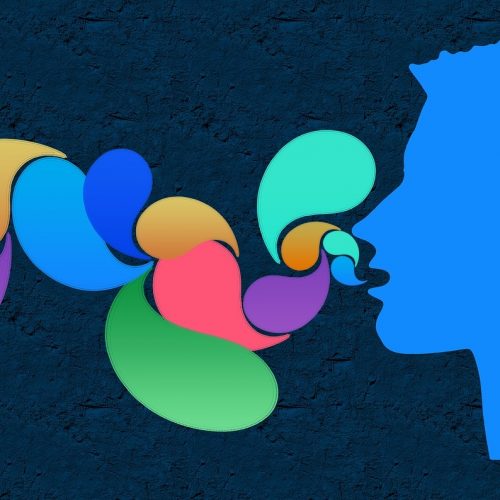
Confessions: I Speak Differently to Different People
Dear Carina,
I will never forget that one time I left you a voice message and when I played it back to listen I cringed at the ‘English for Spanish people’ accent I had spoken in. My friends and family make fun of me all the time because the way I speak changes depending on who I am speaking to, even if I cannot hear it myself. For whatever reason, my accent, my speech velocity, etc. are impacted by the situation I am in and the people I am with, sometimes intentionally and sometimes I don’t even notice.
While I am not totally sure why I do this, I have a few theories:
 1.) I tend to try and pick up accents: I think this is something that most of us tend to do—copy how other people talk, imitating their speech patterns and word use. My dad says I’m pretty good at accents, but I think there is a fine line between taking on a little bit of an accent and going all out. On occasion I may take it to the next level, especially when I find myself noticing how much I’ve started to talk like someone else and try to autocorrect back to normal. This also leads me to the situation where people who are used to me speaking one way laugh at me when they hear me talking differently with others. And it ties in with the next idea…
1.) I tend to try and pick up accents: I think this is something that most of us tend to do—copy how other people talk, imitating their speech patterns and word use. My dad says I’m pretty good at accents, but I think there is a fine line between taking on a little bit of an accent and going all out. On occasion I may take it to the next level, especially when I find myself noticing how much I’ve started to talk like someone else and try to autocorrect back to normal. This also leads me to the situation where people who are used to me speaking one way laugh at me when they hear me talking differently with others. And it ties in with the next idea…
2.) I don’t actually spend that much time with native English speakers*: When I talk to people in Spanish or Portuguese I also try to pick up the accent (unintentionally, I swear), but I see the most difference when I am speaking English. This means that when I am hanging out with my totally awesome German friends—in case they are reading—I tend to pick up on their speech patterns and word usage. Obviously this is true both ways as they also pick up on words I use, but in groups of multicultural people when I meet someone new oftentimes (I’d say 95% of the time) they don’t think I’m a native speaker.
3.) I like to feel like the people I’m talking to understand me: When I am with non-native speakers, and talking any language, I want them to understand me. This means that I will over pronounce words or use easier vocabulary to make sure I am comprehensible. Maybe, subconsciously this is also why I take on other people’s accents—I figure that if I talk like them, they will understand me better.
 4.) I am ‘in-between’ places or personas: I already talked about how I believe that you can ‘be a different person’ in different languages, and sometimes I find myself stuck in-between these distinct realities. That is to say, when I am “in Spanish” and I switch over to being “in English,” some of my Spanish-self sticks around and I may end up talking English-with-a-Spanish-accent. It may seem bizarre but, on occasion, I find that this means that I can only express myself awkwardly in a language I am supposedly fluent in, and I think this is because my brain is already in another language. Although this doesn’t necessarily mean that I speak differently depending on the people that I am with, it does impact how I speak. For example, when I am with a group that has Portuguese- and English-speaking people and I am switching between languages, the way I speak, and even the accent I use, varies in comparison to if I was only speaking one language (again, probably because I am “in a different personality” when I am in different languages and mimicking the accent of others).
4.) I am ‘in-between’ places or personas: I already talked about how I believe that you can ‘be a different person’ in different languages, and sometimes I find myself stuck in-between these distinct realities. That is to say, when I am “in Spanish” and I switch over to being “in English,” some of my Spanish-self sticks around and I may end up talking English-with-a-Spanish-accent. It may seem bizarre but, on occasion, I find that this means that I can only express myself awkwardly in a language I am supposedly fluent in, and I think this is because my brain is already in another language. Although this doesn’t necessarily mean that I speak differently depending on the people that I am with, it does impact how I speak. For example, when I am with a group that has Portuguese- and English-speaking people and I am switching between languages, the way I speak, and even the accent I use, varies in comparison to if I was only speaking one language (again, probably because I am “in a different personality” when I am in different languages and mimicking the accent of others).
Note: After being in a Portuguese-speaking country or with Portuguese-speaking friends, almost all of my Spanish friends notice a difference in how I speak—sometimes even two or three days after I am back!
Am I the only one who does this? Or have you had this experience speaking differently to different people as well? Let us know!
Sincerely,
Claudia
*Considering the fact that I’ve lived in non-English speaking countries for over eight years and try to immerse myself in the culture this isn’t actually that surprising. Right now, I might have the most native speaking friends that I see on a regular basis than ever before (perhaps a total of 5, not counting my family).





2 Comments
natsukiiscute@seznam.cz
I can totally sympathize with your post! I’m czech, but fluent in English despite me not interacting with any english-talking people whatsoever. Sometimes I even forget czech and when I’m in front of my classmates and I’m trying to teach them English I use oversimplified words just so that they can understand me, I also pick up the czech accent a bit while doing so, just so that they can actually comprehend what I’m saying- however all of that changes when I talk with my english teachers, I tend to get very annoying and also a bit intriguing while I’m at it, speaking about things in a perfectly fluent accent and switching up topics, driving them crazy. This also happens with some people who actually speak English because I taught them to do so. But honestly, I think this thing will still remain a mystery until a certain someone reveals it. :pp Great post loved it!
Sincerely, Spain
Thank you so much for sharing your own experience, Alena! It is funny how we change our ways of communication depending on who we are with.
We are glad you enjoyed reading and hope you find something else you can relate to as well.
Dani and Claudia